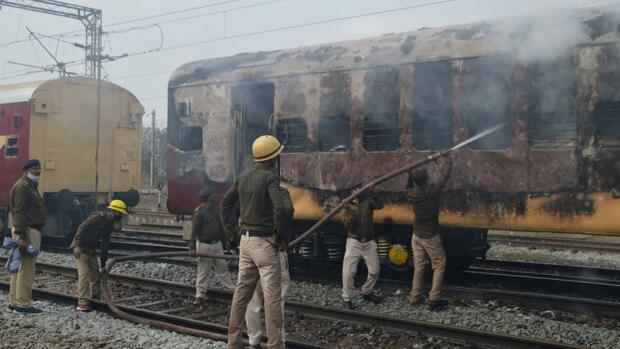Bangkok The frustration of the unemployed in India turned violent: At the end of January, a mob of angry young men stormed the tracks of the state railway in the north of the country – the largest employer on the subcontinent. The protesters set several carriages of a parked train on fire. Photos show thick plumes of smoke pouring out of the windows.
Anger at the state-owned company’s job allocations in the states of Bihar and Uttar Pradesh triggered the incident. In the most recent application process, most of them had no chance: more than twelve million candidates had applied for 35,000 vacancies.
For India’s Prime Minister Narendra Modi, the anger of the unemployed comes at a critical time. It boils up just before the important regional elections in Uttar Pradesh, the outcome of which is likely to be of decisive importance for the further term of office of the 71-year-old.
India’s most populous state, where the week-long voting begins this Thursday, is a political heavyweight with a population of around 240 million – and the elections are a major test of Modi’s support. In the event of significant losses, his reform agenda threatens to falter.
Top jobs of the day
Find the best jobs now and
be notified by email.
An upturn that bypasses the labor market offers political explosives. India claims to be the fastest growing major economy in the world. However, the growth in gross domestic product is not reflected to the same extent in the creation of new jobs.
From the economists’ point of view, this is mainly due to the fact that growth is primarily being driven by the less labour-intensive service sector – while the manufacturing industry is still underdeveloped. Modi’s attempts to attract factories from international manufacturers to the country have made slow progress.
11,000 applicants for 15 jobs
Job seekers therefore often pin their hopes on posts with the state: overwhelming numbers of applicants are now routine there. A few weeks ago, 11,000 applicants presented themselves to the local administration in a city of over a million people south of Delhi, which had advertised 15 jobs. According to media reports, young university graduates with an MBA or law degree also applied for positions as drivers and security guards.
India’s official unemployment rate is currently around seven percent – and has not improved compared to the previous year, when India was stuck in a deep, corona-related economic crisis. The lack of career opportunities hit the under-30s particularly hard: in this age group, around one in four is registered as looking for a job.
According to labor market researchers, however, the problem is much bigger than the official unemployment rate suggests. Many Indians have given up trying to find regular employment. Employment has steadily declined over the past five years.
Should Modi and his party actually suffer significant defeats, observers believe the temporary end of his attempts at reforming the market economy is imminent.
(Photo: Reuters)
In view of the economic problems, Modi’s Hindu nationalist party BJP is facing significant losses among its most loyal supporters. In Uttar Pradesh five years ago she was still able to win around three quarters of the seats in parliament. Modi’s supporters in the state, which is home to more people than Brazil, also carried him to victory in the last national general election.
But now pollsters are assuming that the BJP could lose around a third of its parliamentary seats – also because of dissatisfaction with the party’s corona policy. It is therefore likely to lose many voters to the regional party Samajwadi, which promises social benefits.
Threatening brake on the reform agenda
Elections will also be held in four other states in the coming weeks – including in Punjab, which is characterized by agriculture. There, the head of the so-called Little People Party, AAP, Arvind Kejriwal, complained during an election campaign appearance: “The young people all want to emigrate to Canada because they don’t see any job opportunities for themselves here.”
The results of the five regional elections are expected on March 10th. Should Modi and his party actually suffer significant defeats, observers believe the temporary end of his attempts at reforming the market economy is imminent.
“The BJP’s reform agenda could be put on hold for months or even years in preparation for the 2024 national elections,” said Shilan Shah, India economist at analyst firm Capital Economics.
At the end of last year, Modi reversed a controversial liberalization of the agricultural market after massive protests by farmers in Uttar Pradesh, among other places.
The plan to make the rigid labor law more flexible is also not progressing because of the feared public resistance. Economist Shah believes, “A setback could make the BJP even more reluctant to push ahead with unpopular projects.”
More: India’s finance minister is working on the fastest corona recovery in the world.
